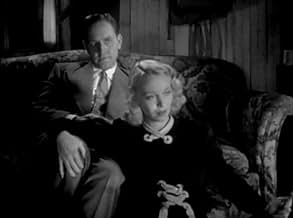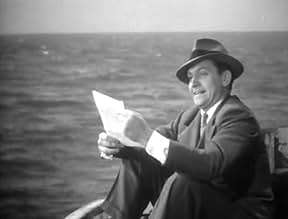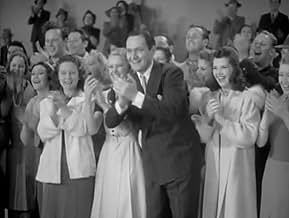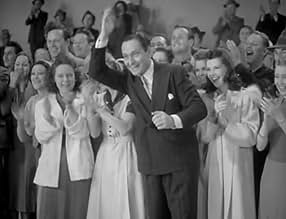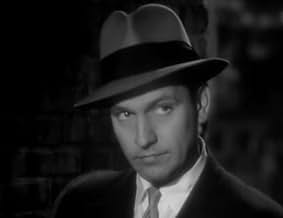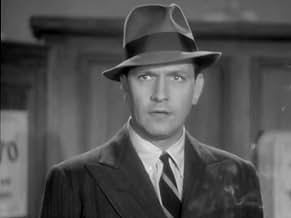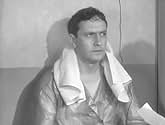IMDb RATING
6.5/10
707
YOUR RATING
A young heiress runs away from her overprotective grandfather. Penniless on the streets of New York, she manages to find employment, but a reporter knows her true identity.A young heiress runs away from her overprotective grandfather. Penniless on the streets of New York, she manages to find employment, but a reporter knows her true identity.A young heiress runs away from her overprotective grandfather. Penniless on the streets of New York, she manages to find employment, but a reporter knows her true identity.
- Director
- Writers
- Stars
- Nominated for 1 Oscar
- 1 nomination total
Syd Saylor
- Robinson
- (as Sid Saylor)
Ernie Adams
- Cafe Counterman
- (uncredited)
Ralph Brooks
- Cafe Customer
- (uncredited)
Horace G. Brown
- Ice Skater
- (uncredited)
George Burton
- Drayman
- (uncredited)
- Director
- Writers
- All cast & crew
- Production, box office & more at IMDbPro
Featured reviews
After all the negative things I have heard said about this film, I was expecting something very...I don't know...boring, silly, empty. But I must say I was more than pleasantly surprised with it and I did enjoy it. I watched it because I just discovered Fredric March, and have watched over 30 of his films now. I must say that this film in no way provided him to display his marvelous acting skill, but still it was nice to see him do this bit of light comedy. I think the story is nice when you want to watch something that is not heavy, but lighthearted and fun with the usual 1930's "happily ever after" ending. It is something my children would enjoy.
Don't have much else to say, except if you like Fredric as much as I do, you will like this film. Too bad he only gave one kiss in this one!!
Don't have much else to say, except if you like Fredric as much as I do, you will like this film. Too bad he only gave one kiss in this one!!
Broadly played and directed semi-screwball outing has charming Fredric March cast as a newspaper reporter assigned to locate a wealthy, beautiful young heiress, who has ditched her fancy surroundings for a regular life in New York City. Grounded, natural Virgina Bruce was a good choice for the rich kid, who ends up working in the department store her family owns, and Patsy Kelly is wonderfully brash as the salesgirl who unknowingly takes her in. The supporting characters are made up of wacky, genial crazies, and the actors have been encouraged to play them to the hilt, resulting in some overcooked comedy which may strike one as either funny or far too silly. There are some classic bits: the ice-skating sequence where March and Bruce end up in a game of Musical Chairs, an unbilled Marjorie Main as a plain-spoken customer in the store, and Kelly's solution to the power going out just before a fancy dinner in her apartment. The script, by Jack Jevne and Eddie Moran (from a story by Ed Sullivan!), was criticized at the time for being too close to "It Happened One Night", but it's actually far less ambitious. The plot set-up is one-half merry mix-up and the other half romantic nuttiness, and many of the lines have a punch-drunk giddiness which is very sweet. **1/2 from ****
This movie was charming. I hadn't noticed Virginia Bruce before this movie and found that she was so appealing. Bruce runs away from grand dad to experience an "ordinary" life of less privilege. She winds up befriended by Patsy Kelly who takes her under her wing finding her a job at a department store. Bruce delightfully plays the part of the runaway heiress turned salesgirl. She meets up with a reporter, Fredric March who discovers that she is the missing heiress. The rest is played out with misconceptions and misunderstandings; the stuff that romance movies thrive on. I just saw her in "Flight Angels" with one of my favorites, Dennis Morgan and I was so happy to see her. It was like seeing an old friend. I am looking forward to discovering more of her movies.
The part of the runaway heiress would have been right up Nancy Carroll's alley. Likewise, I think Virginia Bruce might have been more convincing in Ms. Carroll's part as a scheming shop girl that puts on airs. Ms. Bruce just didn't have the same air of mischief that Nancy Carroll did that could have really added a needed touch of spice to this movie.
Yes, there are similarities to "It Happened One Night" as everyone else has mentioned. There's a runaway heiress, a reporter in the know (Frederic March as Bill Spencer) that winds up falling for said heiress, even the heiress running away from the overbearing elder of the family - in this case her grandfather. However, everything else is pretty unique. In IHON Claudette Colbert's character was forced to live like an ordinary Depression era American in order to blend in with the crowd enough that she could get to her fiancée undetected by her father. Here, Joan Butterfield (Virginia Bruce) has an end goal of being one of those average Americans and standing on her own two feet.
The delight is in the details here - There's Patsy Kelly as Joan's friend, shop girl Peggy O'Brien, demonstrating a vibrating weight loss machine at work and when the electricity goes out in her small apartment, plugging into the flashing sign outside her window. Of course now it takes twice as long to cook dinner and all of her lamps are flashing on and off. Ms. Kelly is practically the third lead here, and her comic performance as Joan's mentor at living the working class life is pitch perfect. She's noisy and assertive as usual, but she doesn't go overboard. Alan Mowbrey as Peggy's boyfriend, a 40-something chiropractic student living across the hall from Peggy that works nights, is a great comic touch. The two humorously meet on the stairwell each evening for a passionate kiss, he as he heads off to work and she as she heads home from work. Not to be overlooked is Eugene Palette as Bill Spencer's perpetually agitated editor. He and March inflict every comic verbal insult possible on one another yet they just can't seem to live without one another - much like Daffy Duck and Bugs Bunny. In fact, I found that Palette and March had much more chemistry together than did Frederic March and Virginia Bruce.
This is one film where the scenery along the way is much more interesting than the ultimate destination as I felt the conclusion landed with a thud and seemed rather forced. Still I'd recommend it just for all the goofy stuff that you could only find in Hal Roach productions in the 30's. Ultimately it's a satisfying feel-good little film.
Yes, there are similarities to "It Happened One Night" as everyone else has mentioned. There's a runaway heiress, a reporter in the know (Frederic March as Bill Spencer) that winds up falling for said heiress, even the heiress running away from the overbearing elder of the family - in this case her grandfather. However, everything else is pretty unique. In IHON Claudette Colbert's character was forced to live like an ordinary Depression era American in order to blend in with the crowd enough that she could get to her fiancée undetected by her father. Here, Joan Butterfield (Virginia Bruce) has an end goal of being one of those average Americans and standing on her own two feet.
The delight is in the details here - There's Patsy Kelly as Joan's friend, shop girl Peggy O'Brien, demonstrating a vibrating weight loss machine at work and when the electricity goes out in her small apartment, plugging into the flashing sign outside her window. Of course now it takes twice as long to cook dinner and all of her lamps are flashing on and off. Ms. Kelly is practically the third lead here, and her comic performance as Joan's mentor at living the working class life is pitch perfect. She's noisy and assertive as usual, but she doesn't go overboard. Alan Mowbrey as Peggy's boyfriend, a 40-something chiropractic student living across the hall from Peggy that works nights, is a great comic touch. The two humorously meet on the stairwell each evening for a passionate kiss, he as he heads off to work and she as she heads home from work. Not to be overlooked is Eugene Palette as Bill Spencer's perpetually agitated editor. He and March inflict every comic verbal insult possible on one another yet they just can't seem to live without one another - much like Daffy Duck and Bugs Bunny. In fact, I found that Palette and March had much more chemistry together than did Frederic March and Virginia Bruce.
This is one film where the scenery along the way is much more interesting than the ultimate destination as I felt the conclusion landed with a thud and seemed rather forced. Still I'd recommend it just for all the goofy stuff that you could only find in Hal Roach productions in the 30's. Ultimately it's a satisfying feel-good little film.
...It doesn't entirely work, unfortunately. Fredric March is excellent, as always. What a fine and versatile actor! And Virginia Bruce is winning, as she always was. She plays an heiress, he a newspaper reporter sent to get a story about her. (This aspect presages the Bette Davis movie "Golden Arrows.") Eugene Palette, always a treat, plays his editor.
Bruce is not an ideal screwball heroine, unfortunately. Her pale, wistful beauty doesn't really lend itself to the genre, though she is dine in the movie. Patsy Kelly is hilarious as her pal: Bruce has sailed to Manhattan in her yacht while granddaddy is away. She finds herself in the City with no money. At a diner (kind of an Automat but not really) she and Kelly scam some food. Kelly picks her up! "If you don't have anywhere else to go, you can spend the night at my place." Kelly's ostensible romantic interest is Alan Mowbry, a neighbor who is studying to become a chiropractor by mail. What a couple they make! Back at the store where Kelly works, which Grandpa owns, we see Kelly demonstrating a device called "Vibrato." It's a kind of Sapphic intimation of the Vega-Meta-Vitamin sequence decades later from "I Love Lucy." The movie has a sterling supporting cast, which also includes Nancy Carroll, delicious as a jealous, catty fellow saleswoman.
It also, unfortunately, has afar too lengthy and pointless scene with Bruce and march at a skating rink. Why it was allowed to go on so long is a mystery. (There is a similar scene in one of Irene Dunne's lesser comedies -- "Joy of Living," I think.) The movie begins in a stylish, chic manner but it loses its way. It could have been in the top tier but as it is it's still fun.
Bruce is not an ideal screwball heroine, unfortunately. Her pale, wistful beauty doesn't really lend itself to the genre, though she is dine in the movie. Patsy Kelly is hilarious as her pal: Bruce has sailed to Manhattan in her yacht while granddaddy is away. She finds herself in the City with no money. At a diner (kind of an Automat but not really) she and Kelly scam some food. Kelly picks her up! "If you don't have anywhere else to go, you can spend the night at my place." Kelly's ostensible romantic interest is Alan Mowbry, a neighbor who is studying to become a chiropractor by mail. What a couple they make! Back at the store where Kelly works, which Grandpa owns, we see Kelly demonstrating a device called "Vibrato." It's a kind of Sapphic intimation of the Vega-Meta-Vitamin sequence decades later from "I Love Lucy." The movie has a sterling supporting cast, which also includes Nancy Carroll, delicious as a jealous, catty fellow saleswoman.
It also, unfortunately, has afar too lengthy and pointless scene with Bruce and march at a skating rink. Why it was allowed to go on so long is a mystery. (There is a similar scene in one of Irene Dunne's lesser comedies -- "Joy of Living," I think.) The movie begins in a stylish, chic manner but it loses its way. It could have been in the top tier but as it is it's still fun.
Did you know
- TriviaAccording to a New York Times article on 16 October 1938, the Citizen's Chiropractic Committee of New York State sued the film producers, authors and Alan Mowbray for $100,000 claiming damages to the profession. One doctor was very upset that the film implied it was possible to go through a chiropractic school through a correspondence course. The outcome of the suit is not known.
- Quotes
Peggy O'Brien: Just think, someday i'll be Mrs. Doctor Pennypepper E. Pennypepper... then I'll find out what the E. stands for!
- Crazy creditsThe opening credits are shown as if viewed through a ship's porthole with waves erasing each set of credits.
- SoundtracksA Life on the Ocean Wave
(1838) (uncredited)
Music by Henry Russell
Lyrics by Epes Sargent
Sung a cappella by Fredric March
Details
- Runtime
- 1h 23m(83 min)
- Color
- Aspect ratio
- 1.37 : 1
Contribute to this page
Suggest an edit or add missing content

